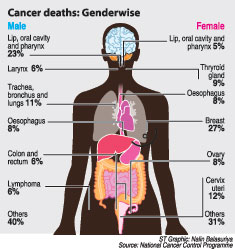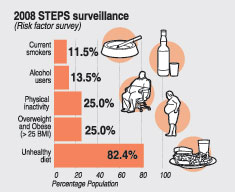News
Cancer on the rise in Sri Lanka
View(s):With World Cancer Day falling on Feb. 4 Charundi Panagoda speaks to health officials who stress the importance of early detection
Two years ago, she was watching television when she felt a “blister” on her right breast. It was a tiny lump, not even half an inch, that hurt just a bit when pressed, kind of “like a pimple.” She immediately consulted her doctor and following some tests, she was diagnosed with breast cancer. She had to undergo a mastectomy, surgical removal of the cancerous breast. She was shocked, but nevertheless considered herself lucky because her condition was detected early and effectively treated. She was not scared because she had known many people with breast or lung cancer.

Cancer in Sri Lanka is steadily on the rise. The country’s cancer incidence rate has doubled since the eighties, according to the latest data (2006) compiled by the National Cancer Control Programme (NCCP).
Statistics indicate that the number of cases and mortality rates from cancer have gone up since 1985. The cancer incidence rate, the number of new cancer cases detected per 100,000 population standardised to exclude effects of population growth, has increased from 31.6 percent in 1985 to 67.9 percent by 2005.
The increase in incidence was higher for females at 79 percent in 2006. However, the death rates from cancer were higher for males at 63.6 compared to 48.7 for females.
Among women, breast cancer was the most prevalent at 27 percent, followed by cervix uteri at 12 percent. Among men, 42 percent of cancers occurred at lip, oral cavity, pharynx, trachea, bronchus, lungs and esophagus.
Cancer, which is categorised as a Non-Communicable Disease (NCD) meaning it’s not infectious, is responsible for nine percent of NCD deaths in Sri Lanka, despite the fact that breast, cervix and oral cancers are preventable and effectively curable when detected early.
According to the World Health Organization (WHO), Sri Lanka ranks the highest in NCDs in Southeast Asia. Sri Lanka’s cancer trend is similar to that of Western countries, NCCP Deputy Director Eshani Fernando told the Sunday Times.
Cancer, characterised by cells growing out of control without dying like normal cells, can be divided into three groups, Dr. Fernando said. The first one-third of cancers can be prevented, the next one-third can be successfully treated if detected early, and for the last one-third, nothing much can be done expect for providing palliative care to ease the patient’s suffering.

“Our emphasis is on the first group, prevention, and the second, detecting early,” Dr. Fernando said. “Now we have started a massive campaign for a risk factor model with television commercials and paper advertisements, where people can calculate how much they are at risk of getting cancer. For example, if you chew three betel leaves per day, you are in the ‘high risk’ category for getting oral cancer.”
Out of the one-third of preventable cancers, about half are preventable by not smoking, NCCP Consultant Community Physician Suraj Perera said. In fact, 80 percent of cancers have four risk factors identified by WHO—unhealthy diet, physical inactivity, alcohol and tobacco.
In Sri Lanka, causes of cancer can be traced to bad eating habits, such as consuming too much animal fat and too little vegetables, obesity, sedentary lifestyles and consumption of alcohol and tobacco. Breast cancer can be caused by eating too much fatty foods and not breastfeeding. Tobacco products cause most of the oral and respiratory cancers.
On one hand, some of these bad habits, such as smoking , have been in decline. Regardless, oral and respiratory cancers have been on the rise because people have moved on to alternative tobacco products, such as Babul or Gulinka. Some come in powdered forms to be snorted, like cocaine.
“Most people now know smoking is dangerous but chewing betel, and arecanuts are also carcinogens and that message still hasn’t gone to people,” Hemantha Amarasinghe, NCCP consultant in community dentistry said. “Even school school-aged children and university students have fallen into this habit.”
Oral cancer has about a 50 percent mortality rate and patients in advanced stages die within five years, Dr. Amarasinghe said. Oral cancer has a pre-malignant stage, as oral lesions, and if diagnosed early in this stage the disease can be successfully treated. Similarly, breast cancer, too, in advanced stages has a high mortality rate, but can be detected early by self or clinical breast examinations. But the problem is at the moment about 70 percent of cancer cases are coming in late, Dr. Jayasuriya said.
The Ministry of Health has set up Well Women clinics in all Medical Health Officer (MOH) areas to increase breast and cervical cancer coverage and early detection. However, turnout at these clinics at district levels is “very low,” NCCP Consultant Community Physician Chiranthika Vithanage said. A study conducted by Dr. Vithanage in 2008 found that either the women were not aware of the clinics or were too preoccupied with children or work to actually attend.
Also, men, vulnerable to oral cancer, were not turning up at dentists as expected for early detection of lesions, Dr. Amarasinghe said. Even if they do, treatment can be complicated because tobacco chewers need additional referrals for addiction treatment, which is not currently happening.

To some extent, medical facilities are also lacking to treat the most prevalent cancers, Dr. Perera said. There are only 10 mammography machines in government hospitals islandwide, despite the rising number of breast cancer patients. Also, lab facilities, such as cytoscreening for cervical cancer, can be conducted only at major hospitals.
Cultural barriers and stigma attached to cancer, too, gets in the way of effective prevention and treatment. Some women, health officials say, choose to live with breast lumps instead of seeking medical help, because they think they are going to die anyway. Betel chewing, a huge contributor to oral cancer, is too entrenched in our culture that some don’t see the danger of continuing the habit.
“What people have to realise is that cancer is not a death sentence,” Dr. Jayasuriya said. “Cancer is very common and if people are aware of the warning signs and seek treatment early, cancer can be prevented.”
Follow @timesonlinelk
comments powered by Disqus


















